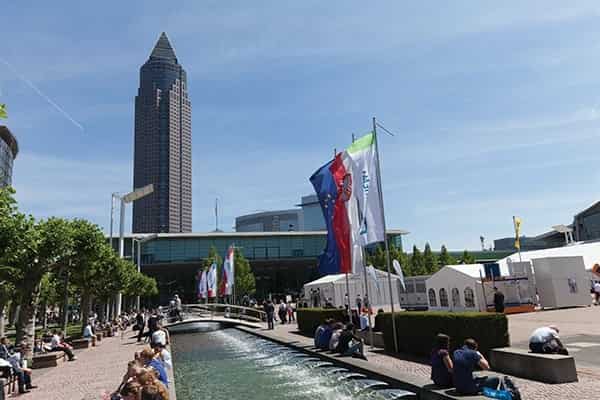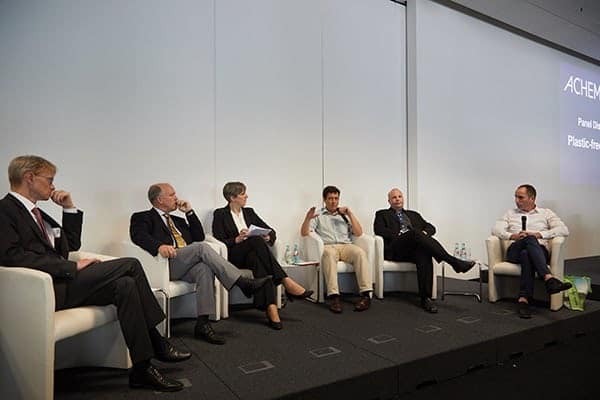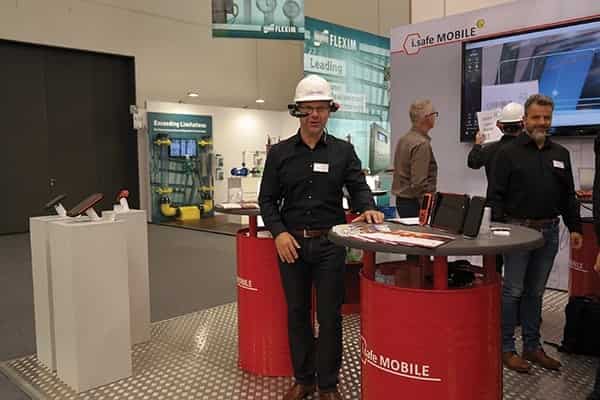Achema 2018 Review Sustainability digitalization flexible production - Arhive
Achema 2018 Review Achema 2018 Review Sustainability digitalization flexible production
By Scott Jenkins
Sustainability, digitalization and flexible production approaches emerged as major themes at the recent Achema 2018 event in Germany
Attendees at June’s Achema (www.achema.de) 2018 trade show for the chemical process industries (CPI) received healthy doses of information on products, technologies and ideas that, in one way or another, were geared toward three areas: increasing the sustainability of chemical processes; utilizing digital tools for efficiency, optimization and training; and implementing flexible manufacturing approaches, including modular construction.
This article provides an overview of some of highlights from Achema that relate to these areas. Achema 2018 Review Sustainability digitalization flexible production
Other emerging developments surrounding Achema were outlined by event organizers at the show’s launch (see sidebar, “Achema Top Trends,” p. 16).

Dechema
Sustainable chemistry
Global population and demographics, combined with environmental protection challenges have been pressuring chemical processors to become cleaner and more efficient, but this Achema event placed a spotlight squarely on how the CPI must change to meet the needs of a sustainable future.Achema 2018 Review Sustainability digitalization flexible production
A good example of this focus at the fair was the activity of the International Sustainable Chemistry Collaborative Center (ISC 3; Bonn, Germany; www.isc3.org), a think tank and multi-stakeholder platform designed to support innovation, entrepreneurship and education in sustainable chemistry.Achema 2018 Review Sustainability digitalization flexible production
Launched last year, the organization sees itself as a “multiplier,” helping innovative products reach markets and promoting new business models.Achema 2018 Review Sustainability digitalization flexible production
The center manages a network of experts, promotes collaboration in the value chain, offers training and financial support — especially in developing countries — and carries out innovation scouting activities to discover new technologies, processes and business models, according to ISC 3 leaders.
Another example of the sustainability theme at Achema was the focus on the topic of plastics use and recycling. Achema 2018 Review Sustainability digitalization flexible production
Although there were several forums for this topic, a panel discussion on Achema’s second day (Figure 1) directly explored the challenges of making plastics more sustainable. The ideas-heavy discussion addressed the complex web of issues surrounding plastics use and recycling, including sustainable design for product packaging, consumer education and behavior, recycling logistics and others. Achema 2018 Review Sustainability digitalization flexible production

Figure 1. This Achema panel discussion explored the issues associated with plastics waste in Europe
Dechema / Jean-Luc Valentin
There was participation on the panel by representatives from a plastics trade group, an academic institute, a waste-management company and the European Commission (EC; Brussels, Belgium; www.ec.europa.eu). Achema 2018 Review Sustainability digitalization flexible production
While several members of the panel emphasized the importance of individual behavior in changing the outlook for plastic waste in the future, the role of governments also came up. The EC representative, Hugo-Maria Schally, from the Directorate General for Environment of the EC, said that government regulations would have to play a role in changing the way plastics are manufactured, used and recycled.
He described a package of initiatives from the EC, including a strategy to handle plastic waste, which has become a huge ocean-pollution problem. The European Strategy for Plastics in a Circular Economy, adopted in January of this year, is designed to foster better design of plastic products, raise plastic recycling rates and increase the quality of recyclates to support the market for recycled plastics.
Among the key strategies for addressing the challenges of sustainability of the CPI is collaboration to re-shape chemical value chains toward more sustainable models. This was the topic of a plenary lecture on the fourth day of Achema from professor Walter Leitner, of the Max Planck Institute for Chemical Energy Conversion (Mülheim; www.mpg.de), and Markus Steilemann, CEO of Covestro (Leverkusen, both Germany; www.covestro.com). Academic-industrial partnerships are critical, Leitner said, because many of the problems of sustainability are complex and interdisciplinary. But also, coupling chemical manufacturing with other industry sectors, such as power generation or steelmaking, can help use energy resources more efficiently and close the carbon cycle, said Steilemann. Covestro has been among the pioneers in exploring non-traditional feedstocks, such as plant-based materials and CO 2 from ammonia manufacturing operations, to make products more sustainable.Achema 2018 Review Sustainability digitalization flexible production
The award ceremony for the 2017 Dechema Prize on the last day of the conference also gave a nod to sustainability.Achema 2018 Review Sustainability digitalization flexible production
Award recipient Timothy Noël, from Eindhoven University of Technology (the Netherlands; www.tue.nl), received the award and presented his work in using sunlight and mild conditions for driving reactions in organic chemistry. Noël and his research group have explored the use of narrow-bore flow reactors and luminescent solar concentrators (LSC) to carry out chemical reactions that traditionally have required high temperatures and aggressive reactants.Achema 2018 Review Sustainability digitalization flexible production
Achema Top Trends
Dechema (Frankfurt, Germany; www.dechema.de), the German society for chemical engineering and biotechnology that organizes the Achema tradeshows, outlined a set of “Top Trends” for this year’s event, organized into seven broad categories. In the “Plant and Project Engineering” category, trends included the shale-gas-driven boom of ethylene cracker projects in the U.S., the continued movement for world-scale megaprojects in the chemical manufacturing area, as well as the trend toward modular engineering for fine and specialty chemicals.Achema 2018 Review Sustainability digitalization flexible production
Many of Achema’s Top Trends involved the industrial internet of things (IIoT) also known as “Industry 4.0”. Achema 2018 Review Sustainability digitalization flexible production
Among the trends are the use of “digital twins” in engineering, easier predictive maintenance, and the use of augmented and virtual reality (AR/VR) for training and education.Achema 2018 Review Sustainability digitalization flexible production
Also, the list mentions the increasing use of data analytics and process simulation to boost process efficiency and optimize processes.Achema 2018 Review Sustainability digitalization flexible production
Although the topic of bio-based chemicals remains a focus for Achema, the relatively low prices for crude petroleum are challenging bio-based processes, according to the trends list. The full list of Achema 2018 Top Trends can be found in the June 11, 2018 issue of the Achema Daily (https://epaper.vogel.de/process_87118), the official publication for the event.Achema 2018 Review Sustainability digitalization flexible production
Digitalization
The incorporation of digital and industrial internet of things (IIoT)-related tools into chemical process operation and monitoring has been a leading theme in the CPI over the last few years, and the trend continued at the Achema event. Many exhibiting companies featured digital offerings, including a proliferation of augmented reality (AR) and virtual reality (VR) demonstrations for a host of applications in maintenance, training and education, and other areas.Achema 2018 Review Sustainability digitalization flexible production
German equipment maker IKA Werke GmbH (Staufen im Breisgau, Germany; www.ika.com) and American software company Bentley Systems Inc. (Exton, Pa.; www.bentley.com) were among the many showcasing AR/VR technologies at Achema.
Another company displaying AR/VR technologies at Achema was i.Safe Mobile (Lauda-Koenigshofen, Germany; www.isafe-mobile.com), which showcased an AR tablet device that mounts to a certified hardhat or helmet (Figure 2).
Users can perform hands-free maintenance and inspection tasks, while taking advantage of the headset’s capabilities, including a live-stream video feature and noise-canceling microphones for audio communications. The headset is suitable for use in hazardous environments, the company says and runs on Android software.

Figure 2. Augmented reality (AR) and virtual reality (VR) technologies, such as the headset displayed by iSafe Mobile, were spread throughout the Achema tradefair
Chemical Engineering magazine/ Mary Page Bailey
Beyond AR/VR, other digital tools in the Achema exhibit halls focused on data analytics and the interaction between human operators and digital systems. An example is Rockwell Automation’s (Milwaukee, Wis.; www.rockwellautomation.com) Factory Talk Analytics, which is designed to provide visibility into a plant’s automation system. Factory Talk incorporates a chatbot, named “Shelby,” that users can query directly. The smart system is designed to learn which topics are of interest to each user and prioritizes information accordingly.Achema 2018 Review Sustainability digitalization flexible production
A companion software system known as Factor Talk Team One allows operators to raise issues that they detect, as well as chat with each other or share photos of faulty equipment, says Rockwell.
Achema’s focus on digitalization extended to a panel discussion on the third day of the show, in which experts discussed the corporate culture changes that must occur along each company’s digital journey.Achema 2018 Review Sustainability digitalization flexible production
Among the messages touched upon by the panelists were that the objective of digitalization should be to provide tangible benefits to operators, including by creating value in the user experience. Also, panelists said that by using digital tools, companies could learn more about their customers over time.
The Achema Worldwide Business Forum for 2018 also had a digital angle, but the emphasis here was not on using digital tools for process optimization, but for e-commerce. The forum showcased companies that have begun to implement strategies for establishing business-to-business (B2B) e-commerce activities in China. Because of a number of factors, including a robust mobile-phone culture, China sits at the forefront of the digital business for chemicals.Achema 2018 Review Sustainability digitalization flexible production
Companies such as Evonik Industries (Essen, Germany; www.evonik.com) and Covestro related their experiences setting up digital sales platforms that took advantage of mobile apps widely used in China, such as WeChat. Covestro has adopted a “human-centric” model for digital business to make it as easy as possible for purchasers of chemical materials to place orders and inquire about product samples.
In a related development, Endress+Hauser Inc. (E+H; Greenwood, Ind.; www.us.endress.com) also recently launched an e-commerce platform designed to streamline customer procurement processes (www.us.endress.com/register). The new e-commerce site offers customers a personalized shopping experience for online purchases. The new site provides 24/7 access to detailed information directly on the website, for both online and offline orders, the company says.
Features include the ability to access RFQs (request for quotes), quotes and orders all in one place. Customers now can easily add products to a shopping cart and see their own pricing details, E+H says.Achema 2018 Review Sustainability digitalization flexible production
All transactions are available online, including all purchase documents. Users can check the status of current orders and see order history. Products can be saved in favorite lists for easy reordering and users can assign their own references to products as well, the company says.
Modular construction
Demand is growing in the CPI for customized products and facilities, and tighter construction schedules and budgets are becoming the norm. Modular-construction approaches address some of these challenges and are growing in popularity worldwide. Modular plants fit well into the Achema 2018 focal topic of “flexible production,” because modular plants allow plant engineers construction advantages and greater adaptability. For example: production capacity can be increased or decreased relatively easily by adding process modules in parallel; product variations can be altered by switching out modular reactors or downstream processing units; and raw material logistics can be addressed by mobile modules.
In one presentation on Achema’s fourth day, Koch Modular Process Systems (KMPS; Paramus, N.J.; www.kochmodular.com) vice president Tom Schafer, argued that modular construction approaches can make smaller, regional-scale chemical plants cost-competitive with world-scale megaprojects in certain locations. Modular construction of plants can help realize cost savings of 25–30% compared to conventionally built facilities. By locating the plant near sources of raw materials and near to customers to cut transport costs, plant economics can match megascale plants that are driven by economies of scale, he says.
An Achema booth set up by the German Electrical and Electronics Manufacturers Association, known as ZVEI (Frankfurt, Germany; www.zvei.org), brought the modular concept to the world of automation. While functional process skids and modular approaches are becoming increasingly common, the modularization of the automation system is less advanced.Achema 2018 Review Sustainability digitalization flexible production
The integration of modular skids into a higher-level, plant-wide control system often proves to be difficult. ZVEI has been involved with the development of Module Type Packages (MTP), which are technology-independent standard descriptions of the properties and interfaces of a process module.Achema 2018 Review Sustainability digitalization flexible production
The MTP concept organizes the automation system into an orchestration layer provided by the control system and module layer for the integrated MTPs. Each MTP allows the export significant information for a process module so it can be integrated into a wider plant automation system.
Related Topics
